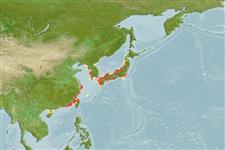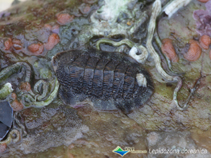Lepidozona coreanica (Reeve, 1847)
Korean chiton| Native range | All suitable habitat | Point map | Year 2050 |

|
| This map was computer-generated and has not yet been reviewed. |
| Lepidozona coreanica AquaMaps Data sources: GBIF OBIS |
Classification / Names Common names | Synonyms | CoL | ITIS | WoRMS
Polyplacophora | Chitonida | Ischnochitonidae
Environment: milieu / climate zone / depth range / distribution range Ecology
Benthic. Subtropical
Distribution Countries | FAO areas | Ecosystems | Occurrences | Introductions
Northwest Pacific: Japan, China, Taiwan, Hong Kong, and Korea.
Length at first maturity / Size / Weight / Age
Maturity: Lm ? range ? - ? cm Max length : 3.8 cm TL male/unsexed; (Ref. 283)
Short description Morphology
Life cycle and mating behavior Maturity | Reproduction | Spawning | Eggs | Fecundity | Larvae
Main reference
References | Coordinator | Collaborators
Burghardt, G. and L. Burghardt 2006 Selected Chitons of Asia, Japan and Pacific region. A Gallery of Worldwide Chitons: http://home.inreach.com/burghart/asia.html[accessed20/01/06] (Ref. 283)
IUCN Red List Status
(Ref. 130435: Version 2025-1)
CITES status (Ref. 108899)
CMS (Ref. 116361)
Threat to humans
Human uses
| FishSource |
Tools
More information
Max. ages / sizes
Length-weight rel.
Length-length rel.
Length-frequencies
Mass conversion
Abundance
Internet sources
BHL | BOLD Systems | CISTI | DiscoverLife | FAO(Publication : search) | Fishipedia | GenBank (genome, nucleotide) | GloBI | Gomexsi | Google Books | Google Scholar | Google | PubMed | Tree of Life | Wikipedia (Go, Search) | Zoological Record



